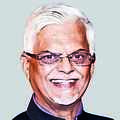 Agencies
AgenciesNiti Aayog CEO Amitabh Kant recently criticised Indian industry for lobbying against FTAs, saying, ‘India will lose huge opportunities if it keeps out of [FTAs] and Indian companies should aim to become globally competitive instead of adopting a protectionist stance.’
This marks a shift in the Modi government’s view of FTAs. BJP returned to power in 2014 questioning the spree of FTAs that the Manmohan Singh government had signed during its decade in office, even though it was Atal Bihari Vajpayee who took the first step signing an FTA with Sri Lanka as early as in 1998. Only a year ago, in July 2020, S Jaishankar told a business event in New Delhi that the FTAs that India had entered into over the years ‘have not been able to largely serve the country’s economy well in terms of building its capacities... there are ways of engaging the world which do not necessarily have to be FTA-centric’. The foreign minister was echoing the popular view within BJP.
Within weeks of assuming charge as India’s commerce minister in 2014, Nirmala Sitharaman joined the ranks of such fellow travellers as the Swadeshi Jagran Manch (SJM), the Left Front, and elements within Congress including Sonia Gandhi, criticising the Singh government on FTAs. In September 2016, Sitharaman ordered a review of India’s FTA policy. In February 2017, GoI's annual Economic Survey 2015-16 concluded that while FTA/PTAs had helped increase India’s overall foreign trade, they had contributed more to an increase in imports than an increase in exports.
Play the PTA Game
The Survey concluded, ‘India has a strategic choice to make: to play the same PTA game as everyone else, or be excluded from this process. The results of our preliminary analysis suggest that Indian PTAs do increase trade without apparently leading to inefficient trade. In the current context of slowing demand and excess capacity with threats of circumvention of trade rules, progress on FTAs, if pursued, must be combined with strengthening India’s ability to respond with WTO-consistent measures such as anti-dumping and conventional duties and safeguard measures.’ It, however, shied away from either endorsing or rejecting FTAs, and called for further research and preparatory work.
Several trade economists have questioned the Modi government’s trade pessimism, demonstrating how FTAs have not had the kind of adverse impact claimed by Indian business and political leadership. While India has liberally used anti-dumping and other WTO-consistent measures to erect barriers to entry, not much has been done to improve the competitive edge of domestic producers. Thus, Kant made bold to tell Indian business last week, ‘You first do manufacturing, bring size and scale, become globally competitive so that you can penetrate the global market. Problem is that Indian manufacturing companies spread protectionism.’
Westward Ho!
It is also interesting to note that many of the FTAs now under consideration also have a geopolitical dimension, like the FTAs during Singh’s tenure. In fact, one criticism of the old FTAs, especially those with Asean, Japan and South Korea, was that geopolitics had stumped economics. In the new FTA round too, there is a discernible geopolitical dimension considering that Indian foreign policy is paying greater attention to India’s relations with the English-speaking world — the US, Britain, Canada and Australia —and with the EU. While diluting its Act East Policy and opting to stay out of the ‘China-led’ Regional Comprehensive Economic Partnership (RCEP) agreement, India seems to be ‘Looking West’ once again with both trade and geopolitics on mind.
While Manmohan Singh was criticised for linking trade policy to his foreign policy objectives, the fact is that the two are indeed intimately linked. That is precisely why Singh constituted a Trade and Economic Relations Committee (TERC), which included the ministers of finance, external affairs, agriculture and commerce along with the deputy chairman of Planning Commission and the national security advisor (NSA).
It is still not clear if GoI’s new thinking on FTAs signals a wider rethink on trade policy, in the context of an assessment that the ‘aatmanirbharta’ strategy has not yet delivered results, or if it is related to shifts in foreign policy objectives.
It is worth noting, in passing, that the PMO official who played a vital role in the functioning of TERC during Singh’s first term in office, his private secretary BVR Subramanyam, has recently been appointed by Narendra Modi as India’s commerce secretary. Subrahmanyam has had a trade policy background and was on the verge of joining WTO in 2004 before he was drafted into the PMO.










 Get Unlimited Access to The Economic Times
Get Unlimited Access to The Economic Times
